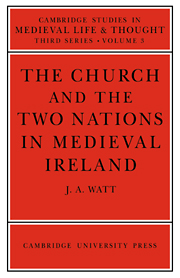Book contents
- Frontmatter
- Contents
- LIST OF MAPS
- FOREWORD
- ACKNOWLEDGMENTS
- ABBREVIATIONS
- 1 THE CHURCH IN IRELAND ON THE EVE OF THE INVASION
- 2 THE ESTABLISHMENT OF THE NEW ORDER
- 3 THE NEW ORDER CONSOLIDATED
- 4 THE CRISIS OF THE CISTERCIAN ORDER IN IRELAND
- 5 ECCLESIA HIBERNICANA
- 6 THE CLERGY AND THE COMMON LAW, 1255–91
- 7 THE CLERGY AND THE COMMON LAW, 1295–1314
- 8 THE EPISCOPATE IN THE REIGN OF EDWARD I
- 9 FOURTEENTH CENTURY DEVELOPMENTS
- 10 THE STATUTE OF KILKENNY
- APPENDIX 1 Canterbury's claim to primacy over Ireland
- APPENDIX 2 The Armagh election dispute, 1202–7
- BIBLIOGRAPHY
- INDEX
2 - THE ESTABLISHMENT OF THE NEW ORDER
Published online by Cambridge University Press: 28 October 2009
- Frontmatter
- Contents
- LIST OF MAPS
- FOREWORD
- ACKNOWLEDGMENTS
- ABBREVIATIONS
- 1 THE CHURCH IN IRELAND ON THE EVE OF THE INVASION
- 2 THE ESTABLISHMENT OF THE NEW ORDER
- 3 THE NEW ORDER CONSOLIDATED
- 4 THE CRISIS OF THE CISTERCIAN ORDER IN IRELAND
- 5 ECCLESIA HIBERNICANA
- 6 THE CLERGY AND THE COMMON LAW, 1255–91
- 7 THE CLERGY AND THE COMMON LAW, 1295–1314
- 8 THE EPISCOPATE IN THE REIGN OF EDWARD I
- 9 FOURTEENTH CENTURY DEVELOPMENTS
- 10 THE STATUTE OF KILKENNY
- APPENDIX 1 Canterbury's claim to primacy over Ireland
- APPENDIX 2 The Armagh election dispute, 1202–7
- BIBLIOGRAPHY
- INDEX
Summary
THE PERIOD OF THE INVASION
Papal policy concerning Ireland had changed by the late summer of 1155. John of Salisbury has recorded this change of heart in the wellknown passage of his Metalogicon wherein he claimed for himself the credit for inducing Adrian IV to entrust the country to Henry II and his successors. John related how the Pope fell in with this suggestion, involving as his warrant for sanctioning the change of rulership, the curious but by no means novel principle that the Donation of Constantine had given him sovereignty over all islands. He therefore sent Henry II a handsome emerald ring in testimony of his concession.
John of Salisbury offered no comment on the motives of the principals concerned in this transaction. Robert of Torigny has written of Henry II's interest in securing Ireland as an appanage for his brother William. As for Adrian IV, it has been argued in Ireland at least from the early fourteenth century, that his main idea was to accommodate the sovereign of his native land. Irish historians have also probed John of Salisbury's mind for the arrière-pensée. He was the devoted secretary of the archbishop of Canterbury. The council of Kells had deprived Canterbury of any last vestiges of its primatial pretensions in Ireland. Canterbury now urged this grant upon the Pope, it is argued, as a means of regaining her lost right.
- Type
- Chapter
- Information
- The Church and the Two Nations in Medieval Ireland , pp. 35 - 51Publisher: Cambridge University PressPrint publication year: 1970

